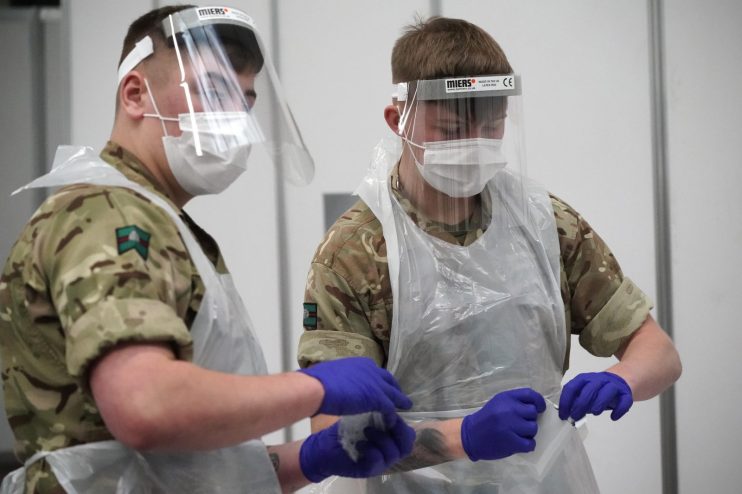Four more London boroughs to roll out rapid Covid tests

Four more London boroughs are set to roll out rapid coronavirus tests, as part of government plans to step up asymptomatic testing across virus hotspots around the country.
Croydon, Ealing, Havering and Hounslow will this week start offering lateral flow tests to the community, meaning 25 out of 32 London boroughs are now involved in the scheme.
Lateral flow tests, which operate on a similar model to pregnancy tests, have a turnaround time of as little as 15 minutes.
The Prime Minister’s official spokesperson this afternoon revealed Boris Johnson has tested negative for coronavirus after receiving one of the rapid tests.
The Covid kits form a key part of government plans to ramp up asymptomatic testing, as health officials attempt to cast a more accurate picture of how many people are infected with the virus on a daily basis.
Each region will receive 10,000 tests as part of a new pilot aimed at testing priority groups, which would then be followed up with weekly allocations equivalent to 10 per cent of local populations.
The government last week published results from an evaluation of the rapid tests, which said they detected around 75 per cent of positive cases, rising to 95 per cent of individuals with high viral loads.
The London boroughs now receiving rapid tests include:
- Barking and Dagenham
- Bexley
- Brent
- Camden
- City of London
- Croydon
- Ealing
- Enfield
- Greenwich
- Hackney
- Hammersmith and Fulham
- Havering
- Hounslow
- Islington
- Kensington and Chelsea
- Kingston upon Thames
- Lambeth
- Lewisham
- Newham
- Redbridge
- Richmond upon Thames
- Southwark
- Tower Hamlets
- Waltham Forest
- Wandsworth
It comes as the number of weekly coronavirus cases rose to a record high over the weekend, after 15,568 new cases took the rate of infection to a fresh height of 173.7 per 100,000 people — i[ from the previous high of 158.5 last Thursday.
Prime Minister Boris Johnson has said the government’s Operation Moonshot plans for mass testing is key to reopening the economy from local lockdowns across the country.
The plans, which are said to cost an estimated £100bn, are being led by the PM’s outgoing chief aide Dominic Cummings, who left Number 10 dramatically last Friday.
But scientists last night sounded alarm bells over the ambitious project, warning that the plans will likely be ineffective and overly expensive.
Professor Allyson Pollock, clinical Professor of Public Health at the University of Newcastle, told reporters the evidence around rapid tests was “poor and weak at the moment”.
“We’re arguing the Moonshot programme really should be paused, until the cost-effectiveness and the value for money of any of these programmes is well established,” she said.
Jon Deeks, Professor of biostatistics at the University of Birmingham, added that analysis of the results showed that rapid tests might miss 25 to 50 per cent of positive cases.
Baroness Dido Harding, who last week faced a grilling from the health committee, said the NHS was now “moving to the next stage of tailored testing”.
Harding, who heads up the NHS Test and Trace programme, told MPs: “Capacity really isn’t the constraint at all — there are millions of these to be deployed. The question is, how to work through these cases but make them fit with the way we live our lives.”